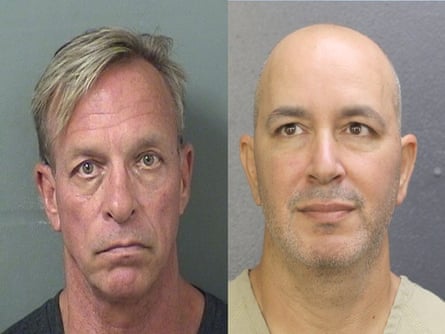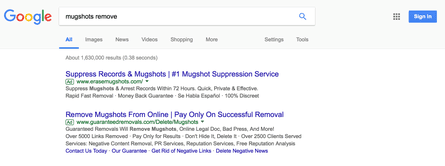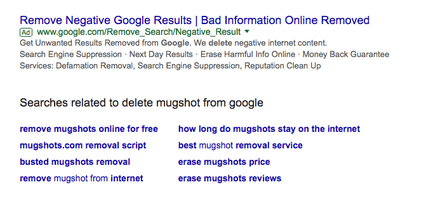Gregory Rakoczy was asleep in his van at a Maryland campsite when six police officers knocked on his door. A fellow camper had Googled his name and found a mugshot indicating he was a felon on the run. He was not.
Rakoczy was arrested and held for 20 hours. Afterward he immediately Googled his own name and found that his picture had recently gone up on Mugshots.com for criminal charges he had faced 15 years ago.
At that time Rakoczy ran a company that installed audiovisual equipment in homes. He was charged with fraud after his firm sold dozens of clients one model of TV but installed a different one – a mistake he said was made by a distributor, but one he should have noticed.
Most of the 90 charges – one for every person sold the wrong TV – were dismissed after he replaced the TVs, and he spent five years on probation for the remaining ones.
He contacted Mugshots.com to take the picture down and they demanded $399, which he paid. But the next day he saw his picture was still on the site and he called them again.
“They told me it was $399 for every charge,” he said. He refused and the mugshot has haunted him ever since.
Rakoczy is one of a growing number of people demanding that lawmakers and search engines do more to clamp down on the predatory industry that has emerged around mugshots. It’s a complex debate that raises questions about public records in a digital age, shame culture and the responsibility of platforms like Google.
Last month the alleged owners of Mugshots.com, one of dozens of sites that publish booking photos and demand payment for their removal, were arrested on charges of extortion, money laundering and identity theft. But the site remains online, along with dozens of others like it.

“It’s really a good sign that finally they’ve been able to get charges against some of the people behind these sites,” said Paolo Cirio, an artist and activist who has dedicated the last few years to campaigning against mugshot extortion. “But it’s a small drop in the ocean.”
Since that incident in May 2012, Rakoczy, who is now an author, has been falsely detained six more times – at the beach, at dinner with his editor, at three other campsites and most recently, in November 2017, he was detained while dining with friends in Alabama. In every case, someone had Googled his name and seen the outdated and inaccurate mugshot record that appears among the top results.
“I’m an old school New Yorker, so every time I am introduced to somebody I say my own name. But then I think ‘oh crap, I’m going to get a knock on my door in 24 hours’,” said Rakoczy, who recently finished his first novel.
Eroding the presumption of innocence
At a federal level, mugshots are not considered public records; they are deemed to be an unwarranted invasion of privacy. But since the early 2000s, local law enforcement agencies in every state – with the exception of Georgia –have shared digital booking photos on their websites as a public notification service.
According to Eumi Lee, a UC Hastings law professor, this shift to the internet transformed mugshots of ordinary citizens from “public records that generally fell into ‘practical obscurity’” into “commodities posted for entertainment and commercial gain”.
Many of the government websites were designed not to be indexed by Google and kept updated. However, sites like Mugshots.com, Busted Newspaper, and Arrests.org, as well as state-level ones like Florida.arrests.org and Phoenixmugs.com, scrape these sites or submit freedom of information requests to get hold of millions of booking records.
The sites then use search engine optimisation techniques to ensure the mugshots rank highly in Google search results – even if the charges were subsequently dropped or the person was arrested due to mistaken identity or law enforcement error.

Not only do these pages humiliate their subjects, but they also damage their chance of finding a job, housing or even potential dates because mugshots create a powerful visual association between the subject and criminal activity, regardless of guilt. (The association is deemed so powerful that courts try to avoid showing mugshots to juries to avoid prejudice.)
Beyond the mugshot sites, there’s an entire ecosystem that profits from the humiliation of those arrested, including reputation management firms, mugshot removal services, media companies that publish mugshot galleries and search engines like Google.
It can be a lucrative business. The founders of Mugshots.com are accused of extorting at least 5,703 individuals in the US to rake in more than $2.4m.
“These websites have made people live in terror of their digital reputation,” said Sarah Lageson, a sociologist who studies the criminal justice system. “People opt out of society and avoid social situations that might result in Google search.”
‘My reputation is everything’
Kim (not her real name), a Canadian in her 30s who runs her own design company, is scared that prospective clients might see her mugshot, which was taken after a violent – and what she alleges was wrongful – arrest as she was leaving a gay bar in Florida in 2014.
Police officers were trying to move the crowd along, but Kim had become separated from her friend so took shelter in a doorway. She explained to a nearby police officer why she was waiting, but he insisted she move. She opened her mouth to protest and within seconds, she alleges, the police officer grabbed her wrist and spun her into the cuff position, slamming her face into the door.
“My eye was split open, my face pressed against the glass with blood streaming down my face,” she said. “All the people in the crowd started screaming ‘police brutality’.”
Kim was taken to hospital for several stitches above her left eye (the Guardian has seen photos of her injuries) before being taken to jail where she was charged with resisting arrest. The charges were dropped days later.
About a month after the incident, Kim’s lawyer called her to say her photo had been posted online. She turned to Google in a panic. Although her charges were dismissed weeks before, her battered face was staring back at her from several mugshot websites.
“It was mortifying. I’d just started my own company and my reputation is everything,” she said, adding that she feels “revictimised” every time she sees the picture.
She started to pay fees of between $200 and $450 to remove photos. Each time her photo was taken down from one site it would pop up on another. It was an expensive game of whack-a-mole.
“I spent $3,000 in total before realising it was a big scam. The second they see you are sucker enough to pay for one it’s up the next day on another,” she said.
Kim had the resources to hire lawyers and pay the take-down fees, but many aren’t.
“We know that people who are not white and people who are poor or mentally ill are disproportionately more likely to be arrested,” Lageson said. “Mugshots are simply a reflection of police discretion.”
Google’s responsibility
The Italian activist Paolo Cirio, who launched a campaign group called Right2Remove, wants Google to either de-index the mugshot websites or massively down-rank them in search results – offering Americans a similar right to those in Europe, where there is a regulation granting the “right to be forgotten”.
“Google is the gatekeeper. It would be great if they acknowledged that these websites are bad actors and demoted them,” he said.
Google has down-ranked mugshot websites in the past. In response to a 2013 New York Times article, Google tweaked its algorithm to dramatically reduce the sites’ prominence in search results. Since then, the sites appear to have worked around the changes and bubbled back to the top.

“We recognise that this is a sensitive issue,” said a Google spokeswoman. “Since 2013, we have had systems that work to decrease the visibility of mugshots for searches for people’s names, while being careful not to inadvertently suppress information that is in the public interest, such as sheriff department sites or sex offender registries.”
It’s a tricky problem because even if the mugshots websites are down-ranked, if an arrestee doesn’t have much of a digital presence their mugshot may still be the first result when someone Googles their name.
Cirio argues that Google is dragging its feet over the issue because it gets paid a small fee every time someone clicks on an ad for the reputation management companies that appear when people search for “remove mugshot” or something similar.
In light of Google’s recent decisions to ban advertising for bail bonds and high-interest payday loans, it wouldn’t be unreasonable to assume they could extend the ban to mugshot extortion sites. And some point to how the company has taken a strong line with other types of photo-based extortion such as revenge porn.
Google said it bans content that “seeks to exploit others”, which includes extortion and blackmail. However, searches reveal it still features many ads promising to remove mugshots for a fee, including one that imitates an official Google website.

Some members of Cirio’s group are taking matters into their own hands, using the dark arts of search engine optimisation and cyber-sleuthing to identify the people who run the sites and attempt to tarnish their reputation online.
For others, regulation is the only solution. So far, 18 states have introduced laws to ban removal fees or insist on accurate postings. However, these still place all the burden on the individual to find their mugshots online, contact the company with proof of the status of their case, and negotiate the removal of the picture.
Eumi Lee proposes a different solution: excluding mugshots from the public records, except when there is a specific law enforcement need or by court order.
“We are at such a pivotal mark in terms of criminal justice reform and also at this point of starting to fear the commercialisation of consumer and government data,” the law professor said.
“Society must recognise the greater privacy interests at stake in the digital era.”
Rakoczy remains pragmatic.
“I am not trying to hide the fact I was arrested, but I have a problem with everyone having such easy access and these sites wanting a buttload of money to take it down.”
Contact the author: olivia.solon@theguardian.com
